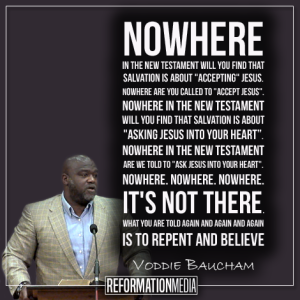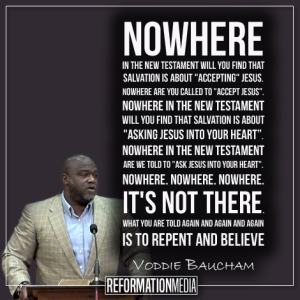View attachment 677
Look at all the Genitives! Genitive of possession and the Definite Article THE faith-not any kind of faith but the God kind of Faith-rightfully belonging to the Father and given to us.
Question
Is it our faith?
Or the faith eis/en Christ Jesus?
The Dative should give you a clue brother.
GRACE CAME BY JESUS CHRIST
This reminds us of God’s statement in John 1:17 and Galatians 4:4 and 5, which we quote: “For the law was given by Moses, but grace and truth came by Jesus Christ.” “But when the fulness of the time was come, God sent forth His Son, made of a woman, made under the law, To redeem them that were under the law, that we might receive the adoption of sons.”
Yes, grace and truth came by Jesus Christ. But He was made under the law. And the sinner who attempts to follow the Lord Jesus under the law will not be under grace; for the law was the ministry of condemnation. The believing sinner, under grace, is in Christ Jesus, free from the condemnation and wrath of the law. He is free also from the law of sin and death, because of the blessed fact stated in Romans 8:2, concerning the law of the Spirit of life in Christ Jesus.
“But we see Jesus who was made a little lower than the angels, for the suffering of death, crowned with glory and honour, that He by the grace of God should taste death for every man.” Hebrews 2:9.
Surely God is the God of all grace. God’s Word declares that grace reigns through righteousness unto eternal life by Jesus Christ our Lord. Romans 5:21.
But let us always remember that this reigning grace is through the death of Jesus Christ. Even after Christ was crucified the door of grace was not opened unto the Gentiles for more than twelve years. Acts 14:27.
“How God had opened the door of faith unto the Gentiles.” Gentile salvation in the Bible should be studied as to whether the scriptural reference is before or after Acts 14:27 as to time.
PAUL THE GRACE PREACHER
It would not be unscriptural to speak of Paul as the “grace” apostle, for in his epistles he uses the word “grace” ninety-seven times. He declared that Christ gave to him for Gentiles the dispensation of the grace of God. Ephesians 3:2. After Paul had delivered his own soul by faithfully proclaiming to Israel in Asia and Europe God’s message for that Nation, after “all they which dwelt in Asia heard the words of the Lord Jesus, both Jews and Greeks”, after Paul was free from the blood of all men, he declared that his Christ-given responsibility was to testify the gospel of the grace of God. Acts 19:10; 20:26; 20:24. Paul declared in thus testifying the grace message, he would finish his course with joy. It was about the same time that he wrote to the Romans: “being declared righteous without a cause by God’s grace.” It was about that time that he wrote to the Corinthians “that the abundant grace might through the thanksgiving of many redound to the glory of God.” II Corinthians 4:15. He wrote to them of “all grace,” “exceeding grace” and “sufficient grace”. II Corinthians 9:8; II Corinthians 9:14; II Corinthians 12:9.
It is quite as significant that in his grace messages Paul was directed to say nothing that would take the Gentiles back the other side of Calvary, to the earthly ministry of the Son of God for their hope and blessing. Certainly his message was not “back to Jesus”. Their door was opened years after that earthly ministry closed with the Saviour’s death and resurrection. Acts 14:27. Paul, in Galatians 1:6 and 15, declared that he was called by grace to preach the grace of Christ. He declared that the grace of God was not bestowed upon him in vain. I Corinthians 15:10.
The Saviour on the cross was full of grace toward Israel when He cried, “Father forgive them, for they know not what they do.” Luke 23:34. And surely the Father was exceedingly gracious when He heard that prayer and saved thousands of those who with wicked hands slew His well-beloved Son. Acts 2:38 to 43.
But the Gentiles were God’s enemies, no people, a foolish nation. God had given them up. Their hope could not be race or religion. By both they were in the world having no hope. Their only hope was pure and unadulterated grace. And that grace was all sufficient. “Where sin abounded, grace did much more (over) abound.” Romans 5:20. Because God was rich in mercy and great in love, He saved the then alienated, lifeless, hopeless Gentiles by grace. By grace are ye saved through faith and that not of yourselves.” Ephesians 2:8 and 9. Not only was God’s grace sufficient for the complete justification, reconciliation, and new creation of those dead Gentiles, but so great was God’s grace that they were given the highest and most glorious place that God can, did, or ever will, give to any company of redeemed sinners.
When the Lord Jesus was in the land of Israel He called Israel to repentance under their covenants but years later the Lord sent forth the message of Titus: “For the grace of God that bringeth salvation hath appeared to all men.” Titus 2:11.
Grace hath appeared to all men. Any kind of a sinner as to race, place and disgrace. No sinner need hesitate because of any shortage of saving grace. God’s grace is abundant. It is over-abounding.
It is interesting to travel with Paul from his oral ministry in the thirteenth chapter of Acts, about 45 A.D. through his written ministry, beginning with his first epistle on to his last, II Timothy, about 67 A.D., and see how the message of grace is developed, until we find the climax in II Timothy 1:9, which we quote again
“WHO HATH SAVED US, AND CALLED US WITH AN HOLY CALLING, NOT ACCORDING TO OUR WORKS, BUT ACCORDING TO HIS OWN PURPOSE AND GRACE, WHICH WAS GIVEN US IN CHRIST JESUS BEFORE THE WORLD BEGAN.”
ABOUNDING GRACE FOR SAINTS
If this infinite inexhaustible grace of God is sufficient for any kind of a sinner, surely it is sufficient for every child of God.
In the Word of God following the statement in Romans 5:20, “where sin abounded grace did much more overabound”, this question is asked: “What shall we say then? Shall we continue in sin, that grace may abound? God forbid. How shall we, that are dead to sin, live any longer therein?
“Christ died for all, that they which live: should not henceforth live unto themselves, but unto Him which died for them and rose again.” II Corinthians 5:15. “For in that Christ died, He died unto sin once; but in that He liveth, He liveth unto God.” Romans 6:10.
“Christ died for our sins.”
If Christ, by the grace of God, tasted death for every man then, by that same grace of God every believer is dead unto sin. Very few of God’s people have fully appreciated, or even appropriated, the blessed truth of identification; that is, the glorious fact that the redeemed sinner is identified with Christ in death, burial, and resurrection. He has been baptized into the death of Christ; and by the same Divine baptism he has been raised to walk in newness of life. He is also seated with (Christ where Christ is, far above principality, power, and dominion. Ephesians 1:20 and 2:6.
It is very interesting to study the “much more’s” in the fifth chapter of Romans, and learn that God’s grace is altogether sufficient for every task, every test, every trial, every temptation, every tribulation, and every thorn of every believer. What a wonderful statement we have in II Corinthians 9:8, “God is able to make all grace abound toward you; that ye, always having all sufficiency in all things, may abound to every good work.”
Surely this super-abounding, inexhaustible grace, this ample provision for all things, leaves all believers without excuse. When the child of God blunders and fails, stumbles and falls, it is not because of any shortage of Divine grace. This marvelous provision for the believer’s spiritual life of victory is definitely stated in Titus 2:11 to 13, which we quote:
“For the grace of God that bringeth salvation hath appeared to all men, teaching us that, denying ungodliness and worldly lusts, we should live soberly, righteously, and godly, in this present world; looking for that blessed hope, and the glorious appearing of the great God and our Saviour Jesus Christ.”
In the next chapter, Titus 3:7, we read these words: “That being justified by His grace, we should be made heirs according to the hope of eternal life.”
So we see that salvation, whether from the penalty or from the power of sin, is grace from first to last.
The grace of God teaches us what to deny, ungodly and how to live; soberly, righteously, and godly; to look for that blessed hope, the glorious appearing great God and Saviour Jesus Christ. And when that hope is realized, believers shall be saved from the very presence of sin. They shall then appear with Christ in glory and come into a new realization of that eternity of grace expressed in Ephesians 2:7; “in the ages to come He might show the exceeding riches of His grace in His kindness toward us through Christ Jesus.” Surely the Bible tells of an eternity of grace.
Praise our wonderful Savior and great God-Jesus Christ and our Abba-Father-who saved a wretch like me.
The God of the Bible is the God of all grace. I Peter 5:10. The grace of God is infinite, illimitable and inexhaustible. We find a number of Scriptures for the subject of this message; but first we quote two verses, the one which speaks of God’s grace before the world began, and the other which tell

bereanbiblesociety.org




